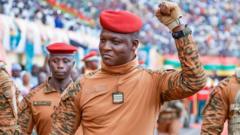Despite controversies, Traoré's image as a champion for African sovereignty resonates widely and reflects growing frustrations towards the West's influence in the region.
**Ibrahim Traoré: The Rising Star of African Pan-Africanism**

**Ibrahim Traoré: The Rising Star of African Pan-Africanism**
Amidst a rise in military leaderships across Africa, Burkina Faso's Capt Ibrahim Traoré has captured global support with his radical message and anti-imperialist stance.
In a remarkable twist on the political landscape, Captain Ibrahim Traoré, the 37-year-old military ruler of Burkina Faso, has become a symbol of a new wave of African leadership that champions anti-colonial sentiment and pan-African ideals. Since his ascendancy to power following a coup in 2022, Traoré has crafted an image reminiscent of iconic leaders like Thomas Sankara, and his rhetoric has been widely embraced across Africa and beyond.
Traoré's rise is underscored by a deep-seated frustration among many Africans regarding their relationship with western powers, especially France, the former colonial ruler. He has actively pursued partnerships with Russia, even leading to the deployment of a Russian paramilitary brigade and implementing left-wing economic policies, including the establishment of a state-owned mining company. These policies aim to bolster Burkina Faso’s control over its rich natural resources, demanding foreign firms cede a 15% stake in local operations and emphasizing the need to transfer skills to local citizens.
Despite these ambitious reforms, the junta faces scrutiny, particularly from Western nations and international corporations. Traoré's government has been accused of failing to effectively tackle a decade-long Islamist insurgency, yet his popularity among many citizens has surged, bolstered by social media campaigns and gestures that resonate with the younger demographic in Burkina Faso. Analysts suggest that his appeal lies in his ability to evoke feelings of national pride and hope in a nation grappling with the ramifications of poverty and instability, as well as a general disillusionment with traditional democratic governance.
On the international stage, his speeches at events like the 2023 Russia-Africa summit have elevated his profile further, presenting him as a voice against the perceived puppetry of African leaders. However, his rise has not escaped criticism; figures like French President Emmanuel Macron have labeled him a part of a “baroque alliance” of leaders maneuvering between ideals and geopolitics, pointing out that Traoré's leadership has been marked by crackdowns on dissenting voices within Burkina Faso.
There’s a growing sense that Traoré's political moves may signal a shift in West Africa's trajectory, especially influenced by a 2024 Afrobarometer survey reflecting waning support for conventional democracy among youth populations. Traoré’s striking combination of charisma, assertive policies, and ability to resonate with a younger audience may remain a focal point for political analysts observing the evolving dynamics in the region.
As Traoré steers his nation, Burkina Faso stands at a crossroads, grappling with the legacy of its past while facing the uncertainties of the future. He may well endeavor to replicate the revolutionary fervor of past leaders, yet should be wary of the potential pitfalls of consolidated power, as many past military leaders have learned. The world watches closely as Capt. Ibrahim Traoré navigates the complex web of local and global politics, inspired by historical echoes and contemporary realities that uniquely define his tenure and that of Burkina Faso itself.
Traoré's rise is underscored by a deep-seated frustration among many Africans regarding their relationship with western powers, especially France, the former colonial ruler. He has actively pursued partnerships with Russia, even leading to the deployment of a Russian paramilitary brigade and implementing left-wing economic policies, including the establishment of a state-owned mining company. These policies aim to bolster Burkina Faso’s control over its rich natural resources, demanding foreign firms cede a 15% stake in local operations and emphasizing the need to transfer skills to local citizens.
Despite these ambitious reforms, the junta faces scrutiny, particularly from Western nations and international corporations. Traoré's government has been accused of failing to effectively tackle a decade-long Islamist insurgency, yet his popularity among many citizens has surged, bolstered by social media campaigns and gestures that resonate with the younger demographic in Burkina Faso. Analysts suggest that his appeal lies in his ability to evoke feelings of national pride and hope in a nation grappling with the ramifications of poverty and instability, as well as a general disillusionment with traditional democratic governance.
On the international stage, his speeches at events like the 2023 Russia-Africa summit have elevated his profile further, presenting him as a voice against the perceived puppetry of African leaders. However, his rise has not escaped criticism; figures like French President Emmanuel Macron have labeled him a part of a “baroque alliance” of leaders maneuvering between ideals and geopolitics, pointing out that Traoré's leadership has been marked by crackdowns on dissenting voices within Burkina Faso.
There’s a growing sense that Traoré's political moves may signal a shift in West Africa's trajectory, especially influenced by a 2024 Afrobarometer survey reflecting waning support for conventional democracy among youth populations. Traoré’s striking combination of charisma, assertive policies, and ability to resonate with a younger audience may remain a focal point for political analysts observing the evolving dynamics in the region.
As Traoré steers his nation, Burkina Faso stands at a crossroads, grappling with the legacy of its past while facing the uncertainties of the future. He may well endeavor to replicate the revolutionary fervor of past leaders, yet should be wary of the potential pitfalls of consolidated power, as many past military leaders have learned. The world watches closely as Capt. Ibrahim Traoré navigates the complex web of local and global politics, inspired by historical echoes and contemporary realities that uniquely define his tenure and that of Burkina Faso itself.



















